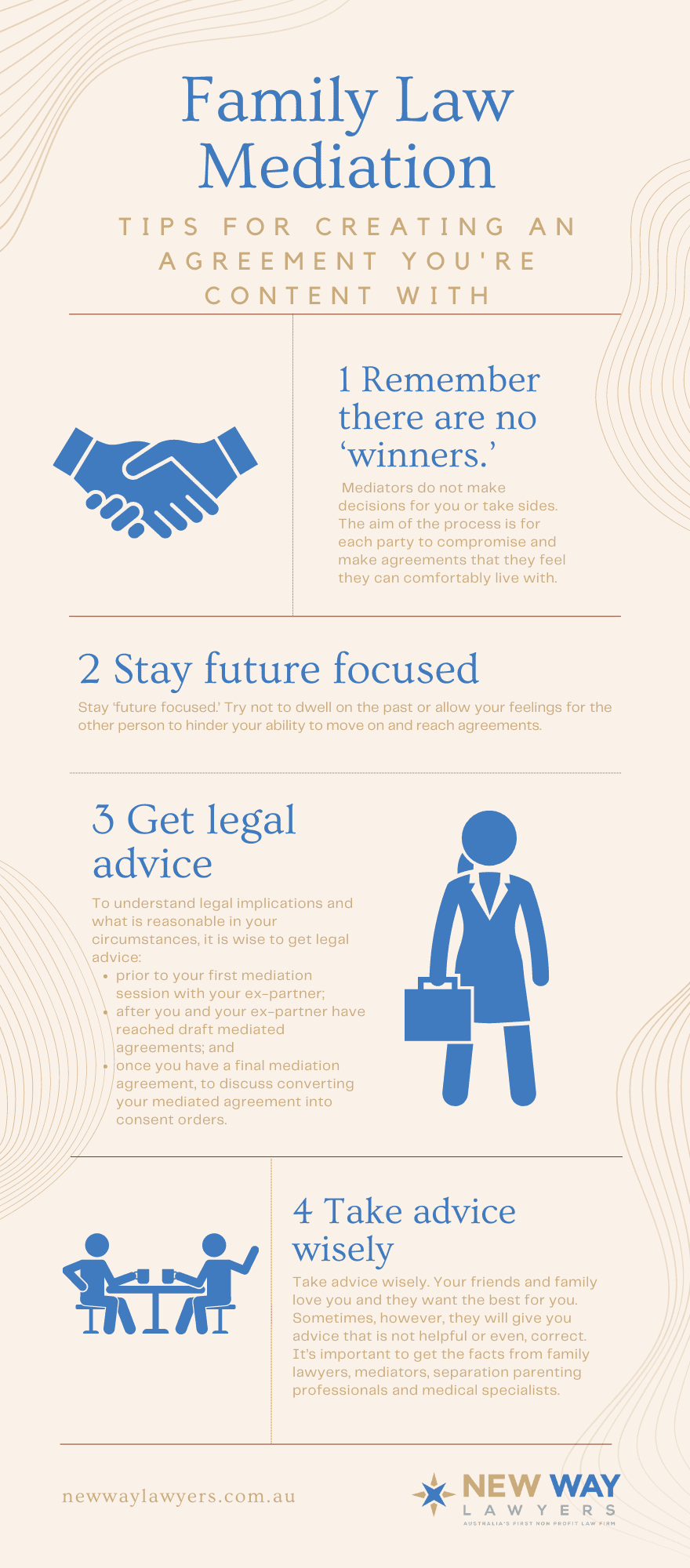-
Parenting Plans: What you need to know
March 28th, 2022 | by newwaylawyersAre you wondering what issues can be included in a parenting plan or how you and your ex-partner can create one? Maybe you’re wondering what a parenting plan actually is? Well, you have come to the right place as we are going to explain what a parenting plan is, what parenting issues can be included in your plan and how you can draft it.
What is a Parenting Plan?
A parenting plan is a written agreement, recognised under the Family Law Act, that sets out the parenting arrangements and responsibilities for one or more children. Both parents or guardians are to work out the arrangements and agree to the plan before dating and signing it.
How can separated parents or guardians create a parenting plan?
There is no specific or required format for a parenting plan. If you and the other parent or guardian are able to agree on the parenting arrangements and responsibilities for the child/ren, you can simply document your agreement and date and sign it.
Services are available to assist you and the other parent or guardian reach agreement through family dispute resolution (FDR). FDR is a process that brings two parties’ together to discuss issues in conflict. A mediator trained in family dispute resolution, works with both parties to reach agreements and work through conflict. Agreed outcomes can be documented into a parenting plan following FDR.
For information as to which services can provide FDR, visit: https://www.familyrelationships.gov.au/talk-someone/centres
Do I need a family lawyer to make a parenting plan?
There is no requirement for a family lawyer to be involved with the making of a parenting plan – parents and guardians can proceed with the assistance of a family lawyer. At any point during the process of arranging a parenting plan a parent or guardian can however engage a family lawyer for advice or assistance if questions or concerns arise.
What issues can be included in a parenting plan?
A parenting plan can include everything concerning the parenting arrangements and responsibilities for your child or children including;
- Allocation or parental responsibility
- Living arrangements and time arrangements for the children with each parent;
- Communication by way of telephone, face-time and/or online time with each parent when not in their care;
- Schools and/or Day care centre’s both parents or guardians agree their children will attend;
- Agreed parenting rules or strategies to be enforced in each house such as not playing video games after 8pm, not having a mobile phone until a certain age, not having ears pierced or hair dyed until both parents agree and so on.
- Financial support arrangements for the children
What should parents or guardians consider when making a parenting plan?
- Children’s best interests are to be prioritised when making long term decisions about the child/ren or day-to-day care and responsibility of the child/ren;
- Children’s wishes and views;
- The age, stage and development of the child/ren;
- Special needs of the child/ren including any medical, learning, developmental and/or psychological needs;
- Education and educational needs of the child/ren;
- Cultural needs of the child/ren;
- Safety needs of the child/ren;
- Practical planning considerations regarding the transport, living arrangements and expenses for the child/ren;
- Suggestions and recommendations from child development professionals;
- Financial responsibilities of each parent that are outside the scope of child support such as extra-curricular activities, additional uniforms and medical treatments involving out of pocket expenses such as dental, orthodontic and optical.
- Strategies for minimising and resolving conflict that may occur between the separated parents or guardians to the plan.
Is a Parenting Plan legally binding?
A parenting plan is not legally binding.
Can I make our Parenting Plan legally binding?
If you would like to make a parenting plan legally binding, you can apply for consent orders which means both parties agree and consent to parenting orders being made.
If you and the other parent or guardian do not agree and want to make an application for parenting orders to the Family Court and Federal Magistrates Court of Australia (FCFCOA), you need to attend Family Dispute Resolution (FDR) prior to making an application with the Court.
For more information on parenting orders and how to apply, visit: https://www.fcfcoa.gov.au/hdi/apply-parenting-orders
If you have further questions about a parenting plan one of our family lawyers would be more than happy to have a free 20 minute phone consultation with you. Simply fill in an online enquiry form and one of our family lawyers will arrange to give you a call.
-
FAQs: Merger of Family Court of Australia and the Federal Circuit Court of Australia
September 7th, 2021 | by newwaylawyersThe Family Court of Australia and the Federal Circuit Court of Australia have merged. Let’s navigate the family law court merger together with some FAQs:
Q: When did the merger take effect?
A From 1 September 2021
Q: What will the new Court be called?
A The amalgamated new court will be known as Federal Circuit and Family Court of Australia (FCFCA).
Q: What is the reason for this merger?
The main reason for the merger is :-
- to reduce costs and delay in family litigation and to encourage proceedings to be conducted in a more calm and civil manner
- to facilitate the fair resolution of disputes as quickly, inexpensively, and efficiently as possible
Q: How will delays and backlogs be reduced?
A: The FCFCA will place greater emphasis on encouraging parties to settle their matters, where it is safe to do so through dispute resolution. This means there will be less final hearings and Court events, reducing the Court’s workload.
Q: What protection will be afforded to children?

A: The FCFCA will place emphasis on the need to protect the rights of children, promote their welfare and protect them from family violence.
Q: Will there only be one Court after the family law court merger?
A There will be one court, but two divisions of that court. The Family Court of Australia will become the Federal Circuit Court and Family Court of Australia (Division 1). The Federal Circuit Court of Australia will become the Federal Circuit Court and Family Court of Australia (Division 2).
Q: What is the difference between Division 1 and Division 2?
Essentially, applications will be filed in Division 2 and appeals will be heard in Division 1.
Q: Will the current Court forms still apply?

A Yes and no. The FCFCA has streamlined its procedures and new forms are now available on the new FCFCA website. The FCFCA will accept the old forms for a grace period of 90 days from 1 September 2021. After this time, the new forms must be used when applying to the Court.
Q: What is the new FCFCA website address?
A: https://www.fcfcoa.gov.au/
Q: What does this mean for my family law proceedings?
A: You will not be required to do anything if your matter is already in the court system. If your matter was previously in the Family Court of Australia, it will now be listed in Division 1. If your matter was previously in the Federal Circuit Court of Australia, it will now be listed in Division 2.
Q What forms am I required to file if I want to commence a financial or parenting application in Court?
A If you are filing an application in the new Court, you can look at their website to find a list of the forms you will be required to file in support of that application.
The Court’s information about required documents for applications can be found here: https://www.fcfcoa.gov.au/fl/ss-overview
If you require any assistance in your family law matter please call us on 07 3548 5850 or contact us here.
-
What happens when you’re not happy with a family law mediation agreement?
August 31st, 2021 | by newwaylawyersFamily Mediation is a cost effective and emotionally supportive process that assists separating couples reach amicable financial, property and parenting arrangements. Sometimes though, you may wonder if an agreement you reached in mediation was the best outcome and whether you should have agreed to it.
Be aware of the emotions that accompany family law mediation
Mediation can be a tumultuous process. Unresolved feelings from the past may surface and fears about the future may also be present. It is important to be kind to yourself while going through mediation and seek counselling support to help you through.
How to feel content with your family mediation agreements
Given mediation can raise a mix of emotions, there are a few simple things you can do to make sure you feel content with an agreement you reach in mediation;
- Remember there are no ‘winners.’ Mediators do not make decisions for you or take sides. The aim of the process is for each party to compromise and make agreements that they feel they can comfortably live with.
- Stay ‘future focused.’ Try not to dwell on the past or allow your feelings for the other person to hinder your ability to move on and reach agreements.
- Get legal advice. It can be beneficial to get legal advice at the following points (1) prior to your first mediation session with your ex-partner, (2) after you and your ex-partner have reached a draft mediated agreement; and (3) once you have a final mediation agreement, to discuss formalising your mediated agreement so it is legally binding . By seeking legal advice at these different times, you can be sure of the implications of what you are agreeing to and what is reasonable in your particular circumstance.
- Take advice wisely. Your friends and family love you and they want the best for you. Sometimes, however, they will give you advice that is not helpful or even, correct. It’s important to get the facts from family lawyers, mediators, other professionals and medical specialists.

So what happens if you reached an agreement in a family law mediation that you now regret?
It is important to know that mediated agreements are not binding. The best course of action is to talk to a family lawyer as soon as possible about the mediated agreement. Remember, seeking legal advice, does not automatically mean you have to go to Court or start a litigious process. In fact, you may simply be able to schedule another mediation and discuss outcomes you feel more comfortable with, based on your legal advice.
If you would like to talk to one of our experienced family lawyers about an upcoming mediation, or a mediation agreement that you are now unhappy with, please contact us today for a free 20 minute consultation.









